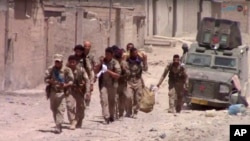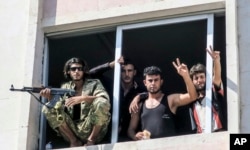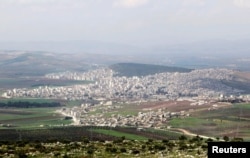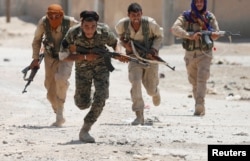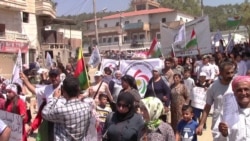Syrian Kurdish officials say Turkey's shelling of Kurdish militias in northwestern Syria and its troops' mobilization in the border region are preparation for a full-fledged military assault on northern Syria, which could impede U.S.-backed operations to rout Islamic State from its de facto capital, Raqqa.
Following intense, cross-border Turkish artillery attacks and military deployments near northwestern Syria's Afrin region since last week, Nasser Haj Mansour, a senior military adviser to the Syrian Democratic Forces (SDF), told VOA that Turkish military actions were a "declaration of war" that could push thousands of U.S.-backed fighters to leave the battlefield in Raqqa and respond to developments in the border region with Turkey.
"Members of the Army of Revolutionaries and YPG who are fighting in the operation for Raqqa will leave that battlefield to defend their homes in Afrin," Mansour told VOA. "This will be a serious setback for the ongoing operation on Raqqa."
The Army of Revolutionaries is a predominantly Arab armed group allied with the Kurdish YPG, also known as the People's Protection Units. The two Syrian groups, along with several other local militias, have formed the SDF, which is supported by the U.S.-led coalition in its Raqqa operation.
The SDF has made advances in Raqqa since the start of the operation last month. It has encircled the city and breached a strategic wall surrounding the last redoubt of IS defenders in Raqqa's Old City neighborhoods.
Turkey opposes the role of the main component of the SDF — the Kurdish YPG — alleging that the group is a terrorist organization linked to Kurdish separatists inside Turkey, known as the PKK. Turkey, the United States and the European Union have designated the PKK as a terrorist group for its decades-long autonomy push against the Ankara government in Turkey's southeast.
Ankara was outraged by a U.S. decision in May to supply arms to the YPG in preparation for the Raqqa operation.
Turkey: 'We are protecting ourselves'
The Turkish government has said its recent military movements in northwest Syria are legitimate measures in response to attacks from the YPG forces in the Afrin region.
"This is not a declaration of war. We are making preparations against potential threats," Turkish Deputy Prime Minister Numan Kurtulmus told the Reuters news agency on Wednesday. "It's ... a legitimate measure so that we can protect our independence. We cannot remain silent against those sending missiles from Afrin."
Turkish President Recep Tayyip Erdogan also said on Wednesday that Turkey was ready to carry out ground operations against the YPG if needed.
"If there is a threat against us, our troops will conduct any operations with the Free Syrian Army on the ground," he told France 24 television.
Turkish artillery has pounded YPG positions in northern Syria several times in the past. To counter the YPG's growing influence and prevent its aspirations for Kurdish autonomy in Syria, Turkey also has supported efforts by several Arab and Turkmen militia groups, part of the rebel Free Syrian Army (FSA), to gain control of a large swath of land in northern Syria.
Kurdish officials say recent Turkish attacks are coming in support of plans by FSA opposition groups to control Afrin.
The YPG has not disclosed whether it suffered casualties from the Turkish shelling, but sources in the Afrin region told VOA that three civilians had been killed and dozens more wounded in the attacks.
Khalil Sabry, an administrator at a hospital in Afrin, told VOA that dozens of civilians from villages situated along the Turkish border had been hospitalized with injuries suffered in the attacks.
"We had to call on civilians to donate blood as the number of injured civilians increased on Tuesday," Sabry added.
One woman, 47, and her two children, 14 and 12, died from the overnight shelling on Tuesday, he said.
The Britain-based Syrian Observatory for Human Rights, an activist-run monitoring group, also confirmed that Tuesday's attacks had hit more than a dozen villages in the region.
The casualties prompted thousands of people to march on streets of Afrin on Wednesday, condemning the attacks and pleading for international intervention.
WATCH: Widespread Demonstrations Held in N. Syria to Protest Turkish Shelling
U.S. perspective
In the past, the U.S. has intervened to ease tensions between its two allies when conflict started to surge. The U.S. military began patrolling along the Turkey-Syria border in April to prevent direct confrontations between the two sides.
U.S. officials say their focus is on defeating IS in Syria and Iraq, and that they expect their allies to all be on the same page. The U.S. says it expects transparency over possible Turkish incursions in the region.
"Our position with regard to that has been fairly consistent with Turkey, which is that the fight in Syria is a complicated one and we need to be in very, very close coordination with our allies, including with Turkey, in terms of what happens there," a senior U.S. official, speaking on condition of anonymity because of government protocols, said in a news briefing Wednesday about U.S. Secretary of State Rex Tillerson's visit to Istanbul on July 9.
The official said the U.S. wants to remain in close contact with Turkey on developments in northern Syria and "reinforce our message to them that any action that they take or we take needs to be done in full transparency with the rest of the coalition to make sure that there are no surprises, and that we're working toward the same goal."




